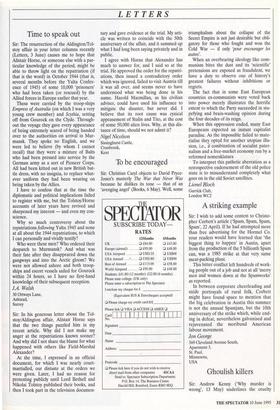LETTERS Time to speak out
Sir: The resurrection of the Aldington/Tol- stoy affair in your letter columns recently (Letters, 3 June) causes me to hope that Alistair Home, or someone else with a par- ticular knowledge of the period, might be able to throw light on the repatriation (if that is the word) in October 1944 (that is, several months before the Yalta Confer- ence of 1945) of some 10,000 'prisoners' who had been taken (or rescued) by the Allied forces in Europe earlier that year.
These were carried by the troop-ships Empress of Australia (on which I was a very young crew member) and Scythia, setting off from Gourock on the Clyde. Through- out the voyage they gave every appearance of being extremely scared of being handed over to the authorities on arrival in Mur- mansk. They spoke no English, and we were led to believe (by whom I cannot recall) that they were a mixture of Balts who had been pressed into service by the German army as a sort of Pioneer Corps. All had been lcitted out in new British bat- tle dress, with no insignia, to replace what- ever uniform they had been wearing on being taken by the Allies.
I have to confess that at the time the diplomatic and political implications failed to register with me, but the Tolstoy/Horne accounts of later years have revived and sharpened my interest — and even my con- science.
Why so much controversy about the repatriations following Yalta 1945 and none at all about the 1944 repatriations, to which I can personally and vividly testify?
Who were these men? Who ordered their despatch to Murmansk? And what was their fate after they disappeared down the gangways and into the Arctic gloom? We were not allowed ashore and both troop- ships and escort vessels sailed for Gourqck within 24 hours, so I have no first-hand knowledge of their subsequent reception.
J.A. Walsh
30 Ottways Lane, Ashtead, Surrey


































































 Previous page
Previous page